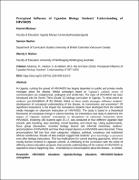| dc.description.abstract | In Uganda, curbing the spread of HIV/AIDS has largely depended on public and private media messages about the disease. Media campaigns based on Uganda’s cultural norms of communication are metaphorical, analogical and simile-like. The topic of HIV/AIDS has been introduced into the Senior Three (Grade 11) biology curriculum in Uganda. To what extent do students’ pre-conceptions of the disease, based on these media messages influence students’ development of conceptual understanding of the disease, its transmission and prevention? Of significant importance is the impact the conceptions students have developed from the indirect media messages on classroom instruction on HIV/AIDS. The study is based in a theoretical framework of conceptual change in science learning. An interpretive case study to determine the impact of Ugandan students’ conceptions or perceptions on classroom instruction about HIV/AIDS, involving 160 students aged 15–17, was conducted in four different Ugandan high schools: girls boarding, boys boarding, mixed boarding, and mixed day. Using questionnaires, focus group discussions, recorded biology lessons and informal interviews, students’ preconceptions of HIV/AIDS and how these impact lessons on HIV/AIDS were discerned. These preconceptions fall into four main categories: religious, political, conspiracy and traditional African worldviews. Results of data analysis suggest that students’ prior knowledge is persistent even after biology instructions. This has implications for current teaching approaches, which are mostly teacher-centered in Ugandan schools. A rethinking of the curriculum with the intent of offering science education programs that promote understanding of the science of HIV/AIDS as opposed to what is happening now—insensitivity to misconceptions about the disease—is needed. | en_US |


